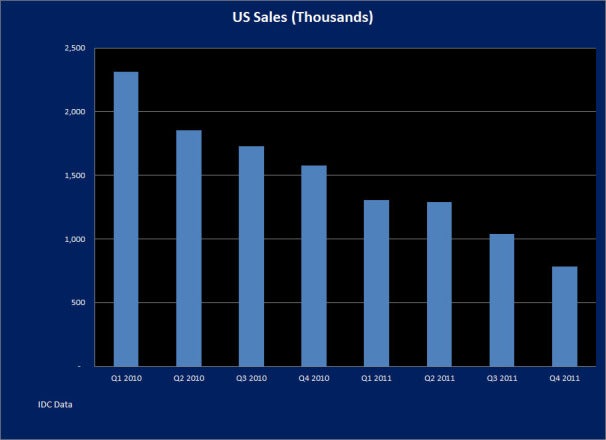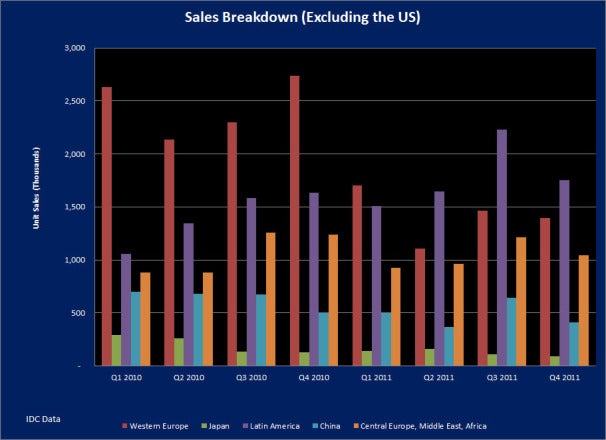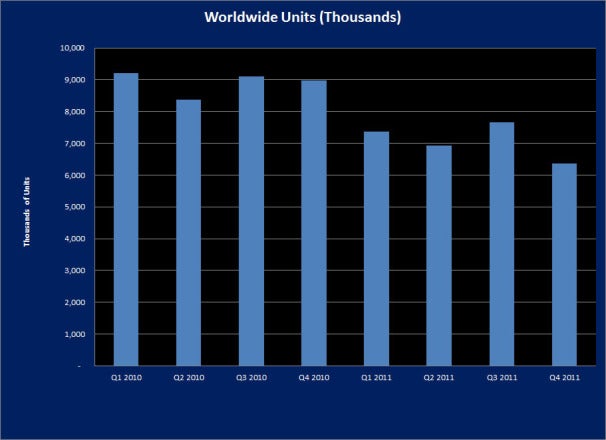Results 1 to 10 of 22
-
February 21st, 2012 02:37 PM #1SOURCE: Are Netbooks Dead? The Prognosis Is Grim | PCWorldAre Netbooks Dead? The Prognosis Is Grim
Netbook sales are declining precipitously. Is the netbook dead, or will it survive as a niche player?
By Loyd Case, PCWorld Feb 21, 2012 12:00 pm

Remember netbooks? Those inexpensive, highly portable, long-battery-life laptops made primarily for lightweight tasks like Web browsing? Netbook sales have declined. In the United States, sales have dropped precipitously since 2010, and the trend in the rest of the world is starting to follow.
When netbooks burst onto the scene in 2007, they seemed to be ideal for people looking for a lightweight, on-the-go computer. As the name suggests, netbooks were designed for Web browsing and online content consumption, as well as for light office work. Performance was limited, however, partly because the machines used the first Intel Atom CPUs and partly because the starter versions of Windows imposed crippling requirements. Microsoft’s licensing limited initial Windows netbooks to a scant 1GB of RAM. In addition, most early netbooks shipped with cramped keyboards, plus tiny, 7- to 10-inch, low-resolution screens.
Despite their limitations, netbooks filled a valuable niche when released. Inexpensive, lightweight, and fairly rugged, netbooks arrived just as the fast and reliable 802.11n Wi-Fi standard began to take off, and most were equipped to support it. Netbooks became the hot new category, and companies rushed to fill a niche pioneered by Asus’s original Eee PC, the first publicly announced netbook.
Netbook Sales Plummet
Today, netbooks have faded from the scene. Dell has stopped selling netbooks altogether. HP seems to be positioning its sole remaining model, the Mini 1104, for the education market. Although netbooks remain available at retail and online outlets, new models are few and far between. Asus, the original netbook maker, is still selling several netbook models.
Starting in early 2010, sales of netbooks “took a nosedive,” IDC analyst David Daoud notes. Netbook sales in the United States in particular fell off a cliff.

The numbers in the chart above represent unit sales in the United States, in millions (source: IDC). The message: Netbook sales have rapidly declined, and continue to drop in one of the world’s biggest PC markets.
Other parts of the world trailed the U.S. trend, however.

Netbook sales growth continued in most of the rest of the world through 2010, but began to tail off sharply in Western Europe by early 2011. Today, growth has all but halted in most areas, except for Latin America. Most of the growth has been in the developing world.
Put all of that data together, and you end up with worldwide netbook sales showing a gradual decline over the past two years, with the trend moving downward overall.

What is happening to netbooks is a classic case of technological innovation killing a product niche, particularly in the United States. When netbooks first launched, users noticed their sluggish performance, mediocre keyboards, and tiny screens. Some manufacturers built netbooks with larger screens, but the increased price and weight made higher-performing laptops seem a better deal.
Netbook Decline Due to Many Factors
The most important thing that happened over the past couple of years was the release of Apple’s original iPad in April 2010. By the launch of the iPad 2 in the first quarter of 2011, netbook sales had started falling more sharply.
It’s unlikely, however, that people who might have bought inexpensive netbooks ran out and bought pricier iPads instead. “The fast decline of the netbook has been the result of many factors," IDC’s Daoud suggests. "First is mainstream consumers' lack of interest in a product that features tiny screens and keyboards. This was at the same time Apple released its first generation of iPads, shifting consumer attention to the tablet. Meanwhile, the PC industry has been refocusing its efforts on higher-margin systems that produce better profits, such as the Ultrabook and upcoming releases of new classes of tablets. All these factors and many others are currently conspiring to bring the netbook into a tiny niche market.”
In other words, users became disenchanted with the sluggish performance and poor experience that netbooks offered, and Apple’s shiny new toy--with its emphasis on responsiveness and ease of use--exacerbated the flaws of the netbook in the eyes of potential buyers.
What’s more, netbook margins were very low, so manufacturers abandoned them. Brian Pitstick, who runs the marketing effort for Dell’s consumer, small, and medium business laptops, notes as much: “The netbook category has declined because netbooks did not deliver on the overall user experience, but rather addressed the category on a price basis.”
Even Asus, which still offers a broad netbook-product portfolio, acknowledges the reality of the market. “Clearly, demand for netbooks is declining and many think this product category is all but dead," Asus's Kevin S. Huang wrote in an email exchange. "Asus created the netbook category, and I think netbooks today still provide the most cost-effective computing product solution servicing certain user segments--i.e., the K-12 education market.”
Manufacturers Turn to Ultrabooks
Intel was one of the prime beneficiaries of netbook growth, with its first-generation Atom processors powering most of the netbooks sold. Intel’s Kathryn M. Gill told us that the company is aware of the decline of the netbook, but remains bullish about its prospects in other markets. “From Intel’s perspective, netbooks, tablets/hybrids, and Ultrabook devices each provide distinct and unique value propositions. The worldwide landscape for computing devices will continue to grow, not decrease. In other words, for the foreseeable future, we see devices coexisting and serving different market segments as well as different user needs, and spanning a wide range of system price points. We believe our 32nm Medfield, Clover Trail, and Cedar Trail products offer winning lineups for 2012.”
Apple is likely responsible for another factor in the decline of the netbook. In late 2010, Apple released a more affordable MacBook Air, replacing the original, pricey 13-inch model with lower-priced 11- and 13-inch models. The base 11.6-inch model costs $999. Taking note of the MacBook Air’s success, Intel developed the Ultrabook idea, a branded standard for very thin laptops. Manufacturers looking to build higher-margin products in the ultraportable-laptop segment, at least for the U.S. market, have turned to Ultrabooks. The jury is still out on the long-term success of Ultrabooks, but early reviews have been favorable.
A Limited Future for Netbooks
The netbook seems to be returning to its roots in the education market. Originally launched as a response to the One Laptop per Child (OLPC) initiative, the netbook is once again targeting education, particularly in emerging markets outside the United States. But the rising tide of low-cost Android tablets may eventually swamp even that niche.
The netbook isn’t dead yet, but it’s clearly on its last legs--at least as a general-purpose, lightweight machine for Web computing. Tablets are filling that role for content consumers, low-cost but better-performing laptops are taking over for home users, and Ultrabooks (plus the MacBook Air) are taking the higher-end slots. The netbook may have a niche in certain markets, but its future is clearly limited and shrinking. Our advice: Don’t buy a netbook today, however attractive the price. You’ll just end up with a dead-end product.
-
February 21st, 2012 02:41 PM #2
Personally, the netbook PC format would become a niche device catering for the entry level PC user especially in developing countries in Asia and elsewhere. It will not die out as a whole.
Although I might question the future CPU replacement for today's Intel Atom CPU which forms the majority of the CPUs used in netbooks today. Would it be an Intel Core i3 derivative scaled down or something else? As I see it, since costs is important with netbooks, it might be a scaled down i3 simply to cut costs.
-
February 21st, 2012 03:12 PM #3
The niche won't go away completely. Just because the iPhone and smartphone derivatives sell in incredibly huge numbers doesn't mean that traditional cellphones have died out. There will still be users who need a simple phone with a keypad... just as there are still users who need a simple portable device with an actual keyboard instead of a touch-screen.

Ang pagbalik ng comeback...
-
February 21st, 2012 03:18 PM #4
The problem with netbooks, part of the reason why these devices are low priced is they are produced in volume. But if they become niche devices, the cost of R&D and production increases significantly. So future netbooks may not be as cheap today (as technology ages and gets replaced by newer tech) OR may have certain features not available to lower production costs. This is why netbooks with 10 inch screen size are more common than ones with 11 or 12 inch screen sizes.
-
February 21st, 2012 03:25 PM #5The netbook isn’t dead yet, but it’s clearly on its last legs--at least as a general-purpose, lightweight machine for Web computing. Tablets are filling that role for content consumers, low-cost but better-performing laptops are taking over for home users, and Ultrabooks (plus the MacBook Air) are taking the higher-end slots. The netbook may have a niche in certain markets, but its future is clearly limited and shrinking. Our advice: Don’t buy a netbook today, however attractive the price. You’ll just end up with a dead-end product.
I don't agree with this.
Whatever electronic PC item you buy today, will be dead in a couple of year's time at a stretch......
15.0K:smoke:
-
February 21st, 2012 03:29 PM #6
People should have the mentality that buying gadgets whatever it is, you can use it at most 2 years time, after that it's practically garbage...
Kadalasan nga eh 1 to 1.5 years obsolete na eh
-
February 21st, 2012 03:30 PM #7
-
February 21st, 2012 03:48 PM #8
Android tablets, especially from generic China, could be a deciding factor too. Some branded androids are already quad-cores. A full screen device has fewer moving parts and cuts down production cost compared to keypads devices, and are "greener". And OS is free, compared needing to pay microsoft for it.
Sa tingin niyo ba are optical devices also an endagered technology? Some manfacturer don't include DVDR or Blu-ray drives. USB memory and external HDD na ang uso?Last edited by Monseratto; February 21st, 2012 at 04:01 PM.
-
February 21st, 2012 04:44 PM #9
Personally, tablets below the price point of around P8,500 are basically "turds". They might be affordable but they are way too slow to be really useful for any real daily use. Also the cheap tablets typically have low resolution resistive touch screens which make reading text difficult and slow to touch input. At best, these are "disposable" toys for people who are on the proverbial fence in deciding to buy a full fledged tablet.
As for optical media, I think they are on the way out but they will still be a niche item for small scale archiving and distribution of digital media. If I need to give someone a digital copy of some photos or videos (that will not fit as an email attachment), I would prefer to burn a cheap CDR than hand over a USB drive costing a few hundred pesos.
CDs and DVDs will still be the standard media for retailing audio and video for a while longer until something better (and more affordable than blu-ray) comes along. Online stores will reduce the total sales though.
On my home computer system, I have been using hard disk as my archive method of choice as the cost per megabyte/gigabyte is cheaper than anything else available. Speed & ease of access is also a big plus compared to the alternative to burning hundreds of DVDRs (or blu-ray equivalent).
-
February 21st, 2012 04:53 PM #10
CDs and DVDs are definitely going to become more and more niche as time goes by. I'm anticipating that we're on the cusp of CD-priced solid-state storage... considering how dense the medium has become, already.
Would be less prone to damage than CDs, though I don't know how they'd compare in terms of longevity.
We really need a new high-terabyte permanent storage solution. It sucks that none of our current tech will outlast properly stored microfiche and microfilm files.
Ang pagbalik ng comeback...





 Reply With Quote
Reply With Quote





3M Color Stable series are all above 50% TSER. RFID readable through the tint, stays good for...
What's the best car tint brand and color?